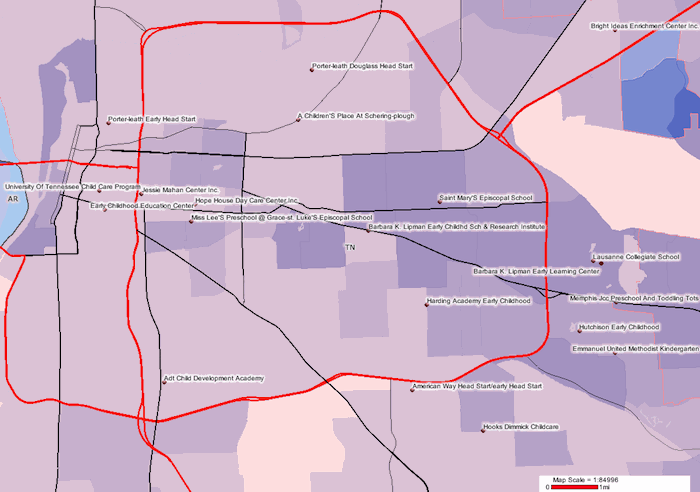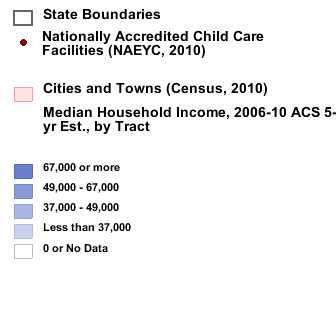All Childcare is Not Created Equal
- Tweet

All children entering kindergarten have received early care in some capacity: from their parents and relatives, from friends and neighbors, or from preschools and early childhood education centers. But not all early care is created equal, and the quality of care that children receive in the first years of life can have a significant long-term influence on their social, emotional, and cognitive development. High quality, center-based childcare is associated with improvements in the cognitive, language and behavioral skills kids need for kindergarten.1
How is Childcare Quality Measured?
Research provides clear and consistent guidelines for what high quality care looks like. Childcare center quality is typically measured in two ways:
- “structural indicators” include staff qualifications and student-to-teacher ratios
- “process indicators” include quality of staff and student interactions and the provision of learning activities
The benefits of attending high-quality early care are particularly important for economically disadvantaged children, and may buffer the effects of growing up in poverty.2,3 Conversely, extended time in low-quality center-based care is linked to behavioral problems in kindergarten, and can delay cognitive and social development at a crucial time in a child’s life.4
The National Association for the Education of Young Children, or NAEYC, evaluates early childcare centers and certifies those that meet their rigorous standards. NAEYC accreditation is considered the gold standard in childcare quality. NAEYC assessments are based on a mix of process and structural indicators, condensed into a list of ten standards. As of 2013, Memphis was home to 33 NAEYC accredited care centers.5
High-Quality Childcare is Not Available for Everyone
While all children deserve access to outstanding care, the effects of early education are most significant for children from economically disadvantaged families—children who are more likely to face other obstacles in their early cognitive and social development. Unfortunately, childcare is expensive in Tennessee, with an average per-family cost of $6,578 per year.6 High-quality care would have an even higher average cost: research shows that higher cost often correlates with higher quality. For example, cost has been linked to quality indicators such as child:teacher ratios.7
Furthermore, Memphis’s NAYEC-accredited care providers tend to be clustered in neighborhoods where wealthier families live, as pictured on the map below. These centers have a total capacity for 3,896 students, and are already operating at an average of 75% capacity.8 Because parents need childcare centers to be close to the places they live and work, it is important that high-quality care centers are available in neighborhoods where low-income families have access to them.

 References:
References:Lee, K. (2005). Effects of experimental center-based child care on developmental outcomes of young children living in poverty. Social Service Review, 79(1), 158-180.
Burchinal, M. R., Roberts, J. E., Riggins, R., Jr., Zeisel, S. A., Neebe, E., & Bryant, D. (2000). Relating quality of center-based child care to early cognitive and language development longitudinally. Child Development, 71(2), 338-357.
Pinto, A. I., Pessanha, M., & Aguiar, C. (2013). Effects of home environment and center-based child care quality on children's language, communication, and literacy outcomes. Early Childhood Research Quarterly, 28(1), 94-101.
Eryigit-Madzwamuse, S., & Barnes, J. (2013). Is early center-based child care associated with tantrums and unmanageable behavior over time up to school entry? Child & Youth Care Forum, 42(2), 101-117.
The Urban Child Institute and Shelby County Head Start. (2013). Shelby County Head Start: Community Needs Assessment. Unpublished. Children’s Defense Fund. (2013). Children’s Defense Fund: The State of Children in Tennessee. Washington, D.C.
Children’s Defense Fund. (2013). Children’s Defense Fund: The State of Children in Tennessee. Washington, D.C.
Maher, E. J., Frestedt, B. B., & Grace, C. C. (2008). Differences in child care quality in rural and non-rural areas. Journal Of Research In Rural Education, 23(4), 1-13.
The Urban Child Institute and Shelby County Head Start. (2013). Shelby County Head Start: Community Needs Assessment. Unpublished.
